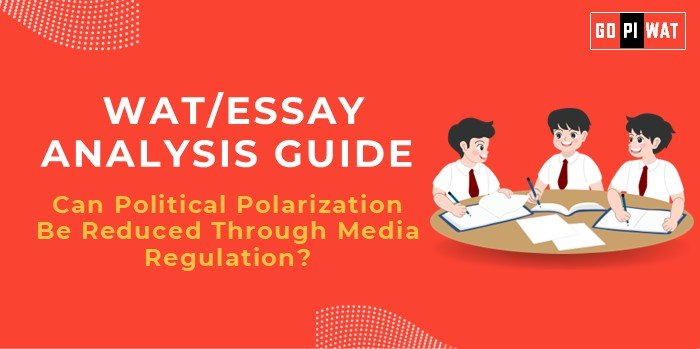📋 WAT/Essay Analysis Guide
🌐 Can Political Polarization Be Reduced Through Media Regulation?
📖 Understanding the Topic’s Importance
Political polarization undermines governance and policy consensus. Media regulation’s potential to mitigate this issue links directly to MBA themes like ethics, governance, and digital innovation.
📅 Effective Planning and Writing
- Time Allocation: Planning: 5 min, Writing: 20 min, Review: 5 min.
- Word Count Distribution:
- Introduction: 70 words
- Body: 375 words
- Conclusion: 55 words
📝 Introduction Techniques
- Contrast Approach: “While digital platforms connect billions globally, they also amplify misinformation, deepening political divides. Media regulation emerges as a potential solution to bridge these rifts.”
- Solution-Based: “Can balanced media regulation foster unity in polarized societies? Exploring this question reveals both challenges and opportunities in curbing misinformation.”
🔍 Structuring the Essay Body
- Achievements: Highlight global successes, such as the EU’s 2022 regulations, reducing fake news by 25%.
- Challenges: Discuss balancing free speech with regulation and enforcement hurdles in weaker democracies.
- Future Outlook: Recommend collaborations and digital literacy to create sustainable solutions.
📄 Concluding Effectively
- Balanced Perspective: “Media regulation alone cannot eliminate polarization but can significantly reduce its intensity when complemented by education and ethical technology practices.”
- Global Comparison: “From Finland’s success to Brazil’s struggles, global experiences offer lessons for tackling polarization through fair and inclusive media regulation.”
🔧 Recommendations for Sustainable Progress
- Promote media literacy programs nationwide.
- Foster transparency in algorithm design.
- Establish independent oversight bodies for media regulation.
📄 Sample Short Essays
- Balanced Perspective: “Media regulation offers a pathway to reduce political polarization but must balance free speech and enforcement fairness. A collaborative approach involving governments, platforms, and citizens is crucial.”
- Solution-Oriented: “Finland’s success in combating misinformation through education highlights the role of citizen empowerment alongside regulation to address polarization.”
- Global Comparison: “The EU’s Digital Services Act and Finland’s literacy programs showcase how tailored strategies can address polarization, offering valuable lessons for other nations.”


